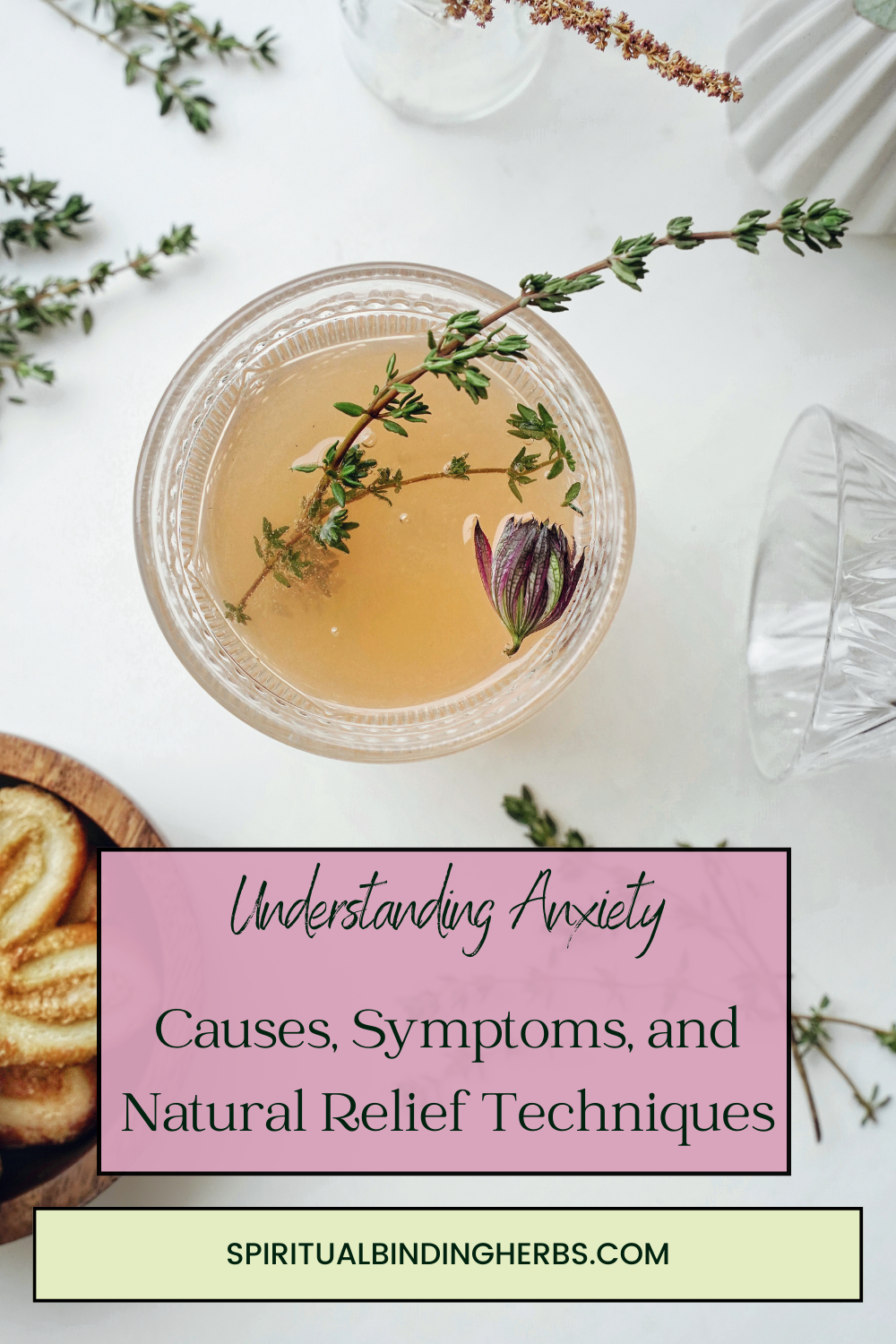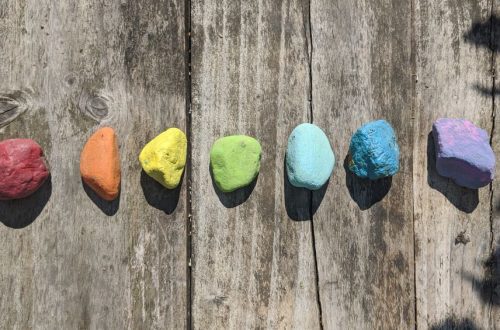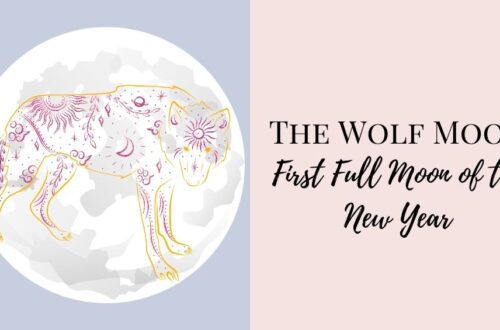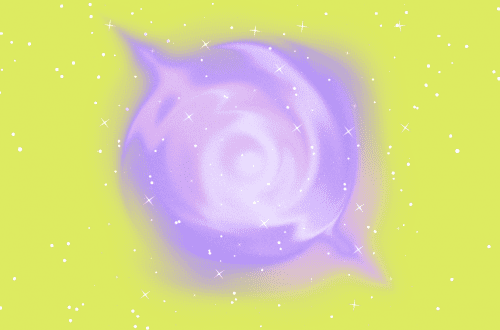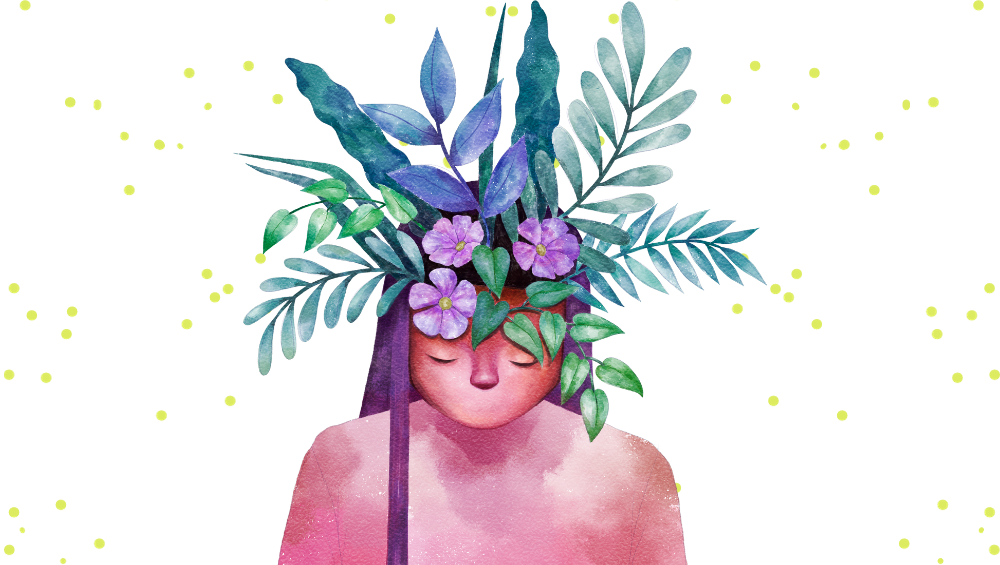
Understanding Anxiety: Causes, Symptoms & Natural Relief Techniques
What is Anxiety
Anxiety is a normal and often adaptive response to stress or perceived threats. It is a natural part of the human experience and serves as a built-in alarm system that prepares the body to respond to potential dangers. When faced with a threatening or challenging situation, anxiety triggers the “fight or flight” response, which involves a surge of hormones such as adrenaline and physiological changes aimed at preparing the body to confront or flee from the threat.
However, when anxiety becomes chronic or excessive, it can have a range of physical and psychological effects on your body.
Oftentimes times, there is no one trigger, and just making it through the daily to-dos can be an uphill battle. For me, my anxiety was most likely always there growing up but was masked more by depression. As I grew and the responsibilities of adulthood became more and more, anxiety took over, and depressive episodes were a byproduct, not my main mental health issue.
This may change often in your mental health journey, and I strongly encourage you to find a healthcare professional that you can connect with. This may take time, it took me a few years to find the right people, from a general practitioner to a mental health therapist.
Anxiety disorders are a group of mental health conditions characterized by persistent and excessive anxiety or fear that can interfere with a person’s daily life, relationships, and overall well-being. Common anxiety disorders include:
Generalized Anxiety Disorder (GAD): Persistent and excessive worry about various aspects of life, often without a specific cause or trigger.
Panic Disorder: Recurrent and unexpected panic attacks characterized by intense fear and physical symptoms like chest pain, rapid heart rate, and shortness of breath.
Social Anxiety Disorder (Social Phobia): Intense fear and avoidance of social situations due to the fear of being judged or embarrassed.
Specific Phobias: Intense and irrational fears of specific objects or situations, such as heights, spiders, or flying.
Obsessive-Compulsive Disorder (OCD): Intrusive and distressing thoughts (obsessions) that lead to repetitive behaviors or mental acts (compulsions) aimed at reducing anxiety.
Post-Traumatic Stress Disorder (PTSD): Occurs after exposure to a traumatic event and involves symptoms such as flashbacks, nightmares, and severe anxiety.
Separation Anxiety Disorder: Excessive fear or anxiety about separation from loved ones or attachment figures, often seen in children but can persist into adulthood.
Here’s what happens to your body when you have anxiety
Increased Heart Rate: Anxiety triggers the release of stress hormones like adrenaline, which causes your heart rate to increase. This prepares your body for physical action. This can lead to a panic attack since this sensation gives the mind a sense of having a heart attack.
Rapid Breathing: You may start breathing faster to ensure your body gets enough oxygen for the potential physical demands of a stressful situation.
Muscle Tension: Often leads to muscle tension, which can result in muscle aches, headaches, or even jaw clenching (bruxism). This may happen subconsciously, so you may not even notice you are tensing up, and may only happen when sleeping in some people.
Sweating: Increased anxiety can lead to excessive sweating as your body tries to cool down during the stress response.
Digestive Issues: Can affect your digestive system, leading to symptoms like nausea, diarrhea, or abdominal discomfort. Chronic stress may also contribute to gastrointestinal problems over time.
Changes in Blood Pressure: Anxiety can cause fluctuations in blood pressure, potentially increasing the risk of hypertension over the long term.
Cognitive Changes: Anxiety can affect your ability to concentrate, make decisions, or think clearly. Racing thoughts and excessive worrying are common cognitive symptoms. It can also cause overthinking or thinking about past interactions for an extended period of time – what you should have said, what they said, and what their body language said.
Insomnia: Many people with anxiety struggle to sleep well, leading to insomnia or disrupted sleep patterns. This can be due to the constant replay of everything that happened that day and dissecting it all over and over.
Increased Sensitivity to Pain: Anxiety can make you more sensitive to physical sensations, which may increase your perception of pain. Your mind is already on high alert, so this can intensify pain.
Weakened Immune System: Prolonged anxiety or chronic stress can weaken your immune system, making you more susceptible to illnesses. This could range from chronic fatigue, constant sickness, more prone to skin issues.
Changes in Appetite: Some people may experience changes in appetite when anxious, leading to overeating or undereating. Eating can even be a trigger for some.
Increased Urge to Urinate: Anxiety can lead to an increased need to urinate due to the body’s response to stress.
Skin Issues: Skin problems such as hives, eczema flare-ups, or acne can be exacerbated by anxiety. Stress increases cortisol which can effect or manifest through the skin.
Hormonal Changes: Chronic anxiety may disrupt hormone regulation, potentially leading to irregular menstrual cycles or exacerbating hormonal conditions.
Increased Sensitivity to Sensory Stimuli: Anxiety can heighten your sensitivity to sensory stimuli such as noise, light, or touch. That can cause irritability or feeling like you have a “short fuse” for anything outside of your normal stimuli.
Cardiovascular Effects: Prolonged or severe anxiety can contribute to the development of cardiovascular problems, including an increased risk of heart disease.
There is no one-size-fits-all. It’s important to note that not everyone experiences all of these symptoms, and the severity of symptoms can vary widely from person to person. If you or someone you know is struggling, it’s essential to seek help from a healthcare professional or therapist. There are effective treatments available, including therapy, medication, and lifestyle changes, that can help manage and alleviate symptoms.
Herbs that are able to support
- Kava Kava (Piper methysticum): Kava is a plant native to the South Pacific, where it has been used for its calming properties. It is thought to promote relaxation. However, it may have some liver-related side effects, so it should be used cautiously and under the guidance of a healthcare provider and local herbalist.
- Valerian Root (Valeriana officinalis): Valerian is a popular herbal remedy for anxiety and sleep disorders. It may help improve sleep quality and reduce symptoms of anxiety. It’s often used as a mild sedative. Do not use if you are taking SSRI medications.
- Passionflower (Passiflora incarnata): Passionflower is known for its potential calming and anxiety-reducing effects. It may help with mild to moderate anxiety symptoms and is available in various forms, including teas and supplements.
- Chamomile (Matricaria chamomilla): Chamomile tea is a soothing beverage that may help with relaxation and reduce mild anxiety symptoms. It is widely used for its calming properties.
- Lavender (Lavandula angustifolia): Lavender is known for its pleasant scent and potential anxiety-reducing effects. It can be used in aromatherapy, as an essential oil, or as an herbal supplement.
- Lemon Balm (Melissa officinalis): Lemon balm is often used as a mild sedative and is believed to have calming effects. It can be consumed as a tea or taken as a supplement.
- Ashwagandha (Withania somnifera): Ashwagandha is an adaptogenic herb that may help the body adapt to stress and reduce anxiety. It is commonly used in traditional Ayurvedic medicine.
- Rhodiola (Rhodiola rosea): Rhodiola is another adaptogenic herb that may help improve the body’s response to stress. It is thought to enhance mood and reduce fatigue. Do not use if you are taking SSRI medications.
- Ginkgo Biloba (Ginkgo biloba): Ginkgo biloba is an herb that is sometimes used to improve cognitive function and reduce symptoms. It may have antioxidant properties. Do not use if you are taking SSRI medications.
- CBD (Cannabidiol): Derived from the cannabis plant, CBD has gained popularity for its potential anxiety-reducing effects. It does not produce the “high” associated with THC and is available in various forms, including oils, capsules, and edibles. It’s important to use CBD products from reputable sources and consult with a healthcare provider for guidance.
I have used Herm Pharm’s Anxiety Soother and have had pretty good results. You can read more about it here.
Please remember that herbal remedies should be used with caution and under professional guidance. They are not a substitute for evidence-based treatments such as therapy or medication, especially for severe anxiety disorders. It’s important to discuss any herbal supplements you plan to use with your healthcare provider to ensure they are safe and appropriate for your specific situation.
Please note that there are some herbs that should not be taken if you are already taking any SSRI medication. This can cause serotonin syndrome, which can intensify the symptoms of anxiety. Please consult with a trusted healthcare provider if you are taking SSRI medications and wish to introduce herbal supplements to your treatment plan.
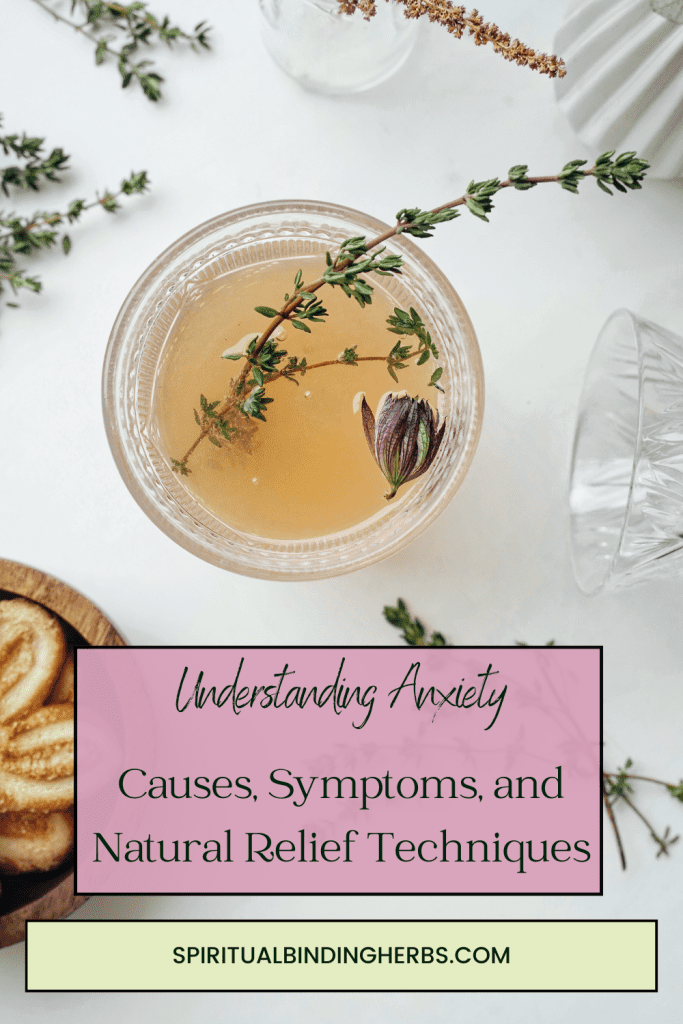
Natural techniques that can help with anxiety
Deep Breathing: Deep breathing exercises can help calm the body’s stress response. Try inhaling deeply through your nose for a count of four, holding your breath for a count of four, and exhaling slowly through your mouth for a count of four. Repeat this several times.
Progressive Muscle Relaxation: Progressive muscle relaxation involves tensing and then releasing muscle groups to reduce physical tension. It can help you become more aware of and control muscle tension caused by anxiety.
Mindfulness and Meditation: Mindfulness techniques and meditation can help you stay grounded in the present moment and reduce racing thoughts and worries. There are various mindfulness and meditation practices to explore, including mindfulness breathing, body scans, and guided meditations.
Yoga and Exercise: Yoga combines physical postures, breath control, and meditation to promote relaxation and reduce anxiety. Regular practice can improve flexibility, reduce muscle tension, and enhance overall well-being. Physical activity can boost the production of endorphins, which are natural mood lifters. Engaging in regular exercise, whether it’s walking, jogging, swimming, or dancing, can help reduce anxiety and stress.
Diet and Nutrition: Eating a balanced diet with a focus on whole foods can support mental health. Some nutrients, like omega-3 fatty acids and certain vitamins and minerals (e.g., magnesium and B vitamins), have been linked to mood regulation. Excessive caffeine and alcohol intake can exacerbate anxiety symptoms. Consider reducing or eliminating these substances from your diet if you’re prone to anxiety.
Journaling: Keeping a journal can help you process your thoughts and emotions. Write down your worries, fears, and any positive experiences or things you’re grateful for. This can provide perspective and promote self-reflection.
Nature: Spending time in nature and engaging in outdoor activities can have a calming effect on the mind. Nature walks, gardening, or simply sitting in a park can help reduce stress. Engaging in creative pursuits or hobbies you enjoy can also be a great way to distract yourself from anxious thoughts and promote relaxation.
Remember that everyone is different, so it’s essential to explore various techniques and find what works best for you.
When to Seek Out Professional Help
It’s important to distinguish between normal, adaptive anxiety, and clinical disorders. Clinical anxiety often requires professional assessment and treatment, which may include psychotherapy, medication, or a combination of both. If you or someone you know is experiencing persistent and distressing symptoms, it’s advisable to seek help from a mental health professional for a proper diagnosis and appropriate management.
If you seeking out additional resources, I suggest checking out ADAA.
Wishing you love, light and inner peace babes ✌🌈✨💜
- Understanding the Different Types of Magnesium and Their Benefits
- How To Make Herbal Preparations: A Beginner’s Guide to Making Magical Herbal Remedies
- Exploring Herbalism: A Beginner’s Guide
- Unlocking SSRI Medication: How They Work and Herbs You Should Avoid
- Understanding Anxiety: Causes, Symptoms & Natural Relief Techniques
